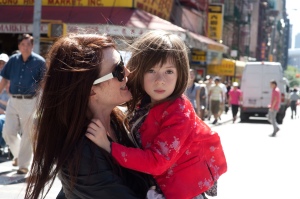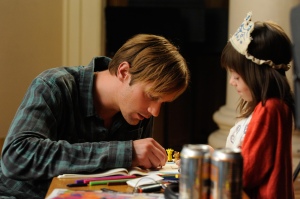Tags
Alexander Skarsgård, David Siegel, film criticism, Julianne Moore, movie review, Scott McGehee, What Maisie Knew
Six-year-old Maisie knows how to take care of things at home while her selfish parents —an aging rock singer (Julianne Moore) and an art dealer (Steve Coogan)— spend the whole afternoon and evening arguing and screaming at each other. She knows how to prepare a peanut butter sandwich and how to tip the pizza deliveryman.
But it is what she will learn, observe and experience in the next few months as her parents go through an acrimonious divorce, remarry and fight over her that is at the heart of “What Maisie Knew,” Nancy Doyle’s and Carroll Cartwright’s adaptation of the Henry James novel directed by Scott McGehee and David Siegel.
Maisie is played by newcomer Onata Aprile, who brings to the role a quiet, open-eyed naturalism. The film is shot from her perspective and we are as amazed and inquisitive as she is about this strange, complicated and contradictory adult world. Maisie finds the love and care she needs among the unlikeliest of people: her nanny and now stepmom Margot (Joanna Vanderham) and her stepfather Lincoln (“True Blood”’s Alexander Skarsgård in a beautifully understated performance).
“What Maisie Knew” is the second film McGehee and Siegel direct that was not written by them (the first one being 2005’s “Bee Season”). I spoke to both during a recent visit to Chicago about the challenges of directing another writer’s script and how they struck gold with Onata Aprile:
This is the second film, out of the six you’ve worked on together, that you directed from another writer’s script. How did you find the script and what caught your eye about it?
David Siegel: It was shown to me by one of the producers, Chuck Weinstock, and to be honest with you when it was described to us we were a little bit allergic to the sound of it. Making a movie about a child who is going through a custody battle could easily tip into the maudlin. But when we read the script we were both taken by its lightness of touch and from a filmmaking perspective we really were challenged by the idea of telling a story from a child’s perspective.
As with other projects that we have approached that we didn’t write we made some revisions to the script. This movie, maybe more than others, continued to go through a revision process as were shooting it and cutting it because Onata gave us so much. We tried to figure out how to tell a story that was really the experience of a child rather than what was going on with the adults.
Henry James may be one of the hardest novelists to adapt to the big screen. From the sound of it, your revisions were made organically.
Scott McGehee: The writers did the heavy lifting in making those choices: what pieces of the novel to use and what things to change to make it more of a film story. One of the things they did was to focus the story on the four main adult characters. They simplified it as well as narrowed the temporal frame to a season whereas in the novel it takes place over several years.
As writers and directors of your own material, how do you work with other writers when directing theirs?
Scott: Writing is fundamental to David’s and my process together. It’s one of the ways that we kind of sync gears. It’s in that process that we understand each other, learn to communicate about materials. That foundation is what we then bring to the set in talking to the actors, that kind of deep understanding of the material. So when we approach something that we haven’t written, we need to have a version of that for ourselves, where we grab the material at its basic DNA level. One of the ways we do that is by going through a set of revisions with the writers and things that don’t feel organic to us, try and dig into to improve it.
David: Neither of the writers are directors or filmmakers. There were aspects of the story that needed to be refined in terms of how they work cinematically. The last step of the final revision we tend to do ourselves.
Onata’s gaze is non-judgmental, impenetrable. You can’t tell what she is thinking. Sometimes I felt that her parents were seeking her approval whenever they spoke to her…How did you direct her?
David: She took direction like a grown-up actor would take direction. Every actor is performing from a natural space and it’s our job to help guide them, but we weren’t guiding Onata in a way that was different from guiding Julianne Moore or Steve Coogan or Alexander Skarsgård. To have that really powerful natural gift and presence in front of the camera is an extraordinary thing to watch. Onata was kind of amazing to watch. It’s the stillness and the subtlety that she is able to convey, that’s why the movie works. That nonjudgmentalness comes from her simple watchfulness.
How did you find her? How many kids did you audition for the role?
Scott: There were literally hundreds. Our casting director Avy Kaufman saw the bulk of them and she just showed us kids who were interesting for us to see. It was a bit of a learning process for us because we saw a lot of kids as we were trying to figure out what it was we really needed. But [Onata] finally came to audition about three weeks before we started shooting. It was pretty nerve-racking. We didn’t have a movie until we had our main character. The movie was greenlit, we were into production, we had offices, everybody was collecting all the material we needed to start shooting but we didn’t have the star.
Tell me about the chemistry between her and the cast.
David: We didn’t do a lot of rehearsal with Onata because we decided early on, whether it was right or wrong, that to rehearse or coach her too much would make her performance a little bit more stale. She is really an adaptable child. She really adored Alexander Skarsgård, she had a crush on him and he was really really good at being her pal. He really liked Onata. The first time he met her he got down to the floor and started coloring with her. She showed a kind of pure spirit.
Even though the film ends in a rather upbeat note there is still an uncertainty about what’s going to happen to Maisie.
David: We worked a lot on the ending and the ending is different than the script in terms of what happens between Julianne’s and Onata’s characters. We wanted to leave Maisie leaning towards that opening of her life, and yet at the same time there is some degree of reception for her mother and some degree of hope. She is moving on from a bad place to a place full of possibilities. What happens after that is up for grabs.


